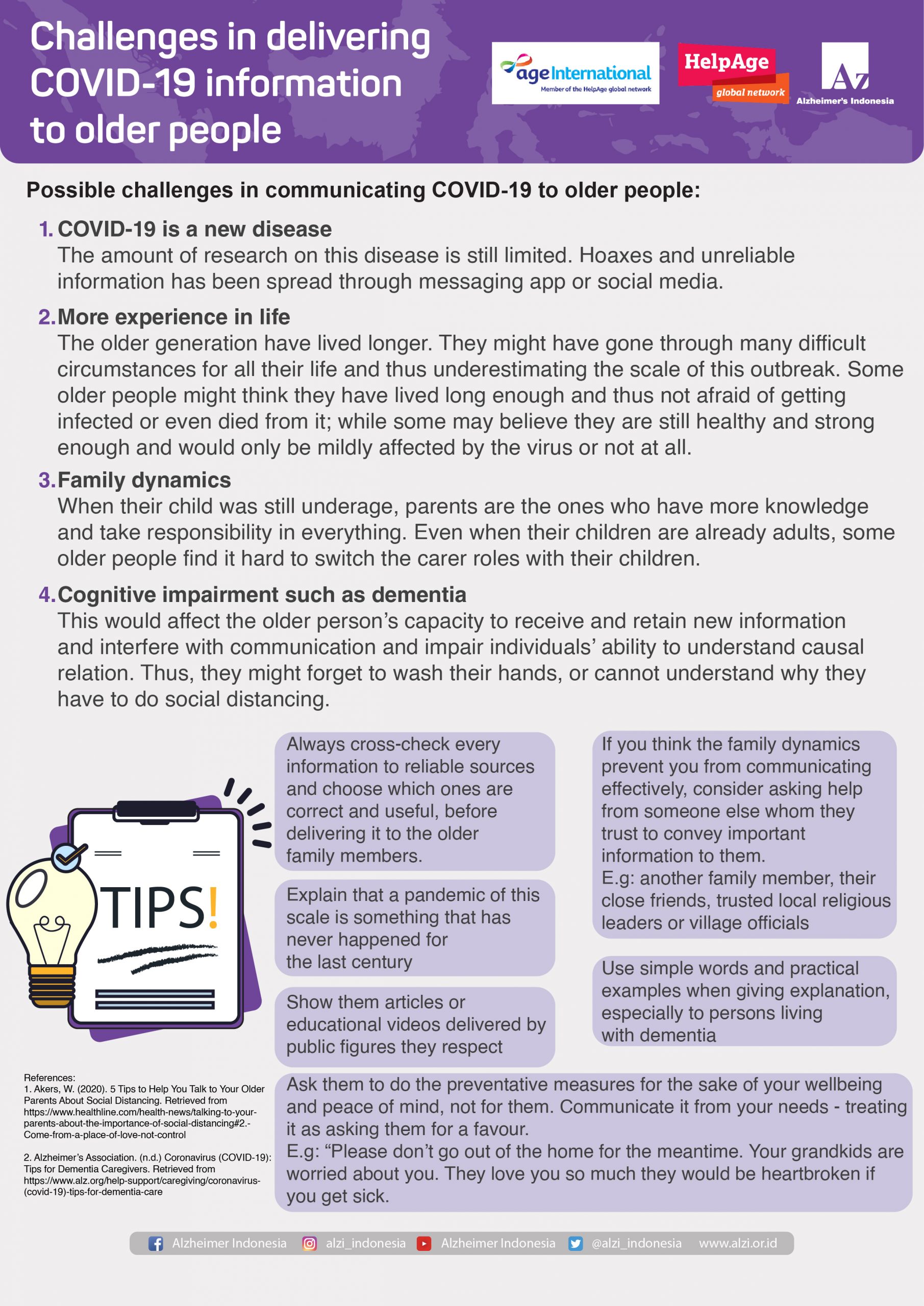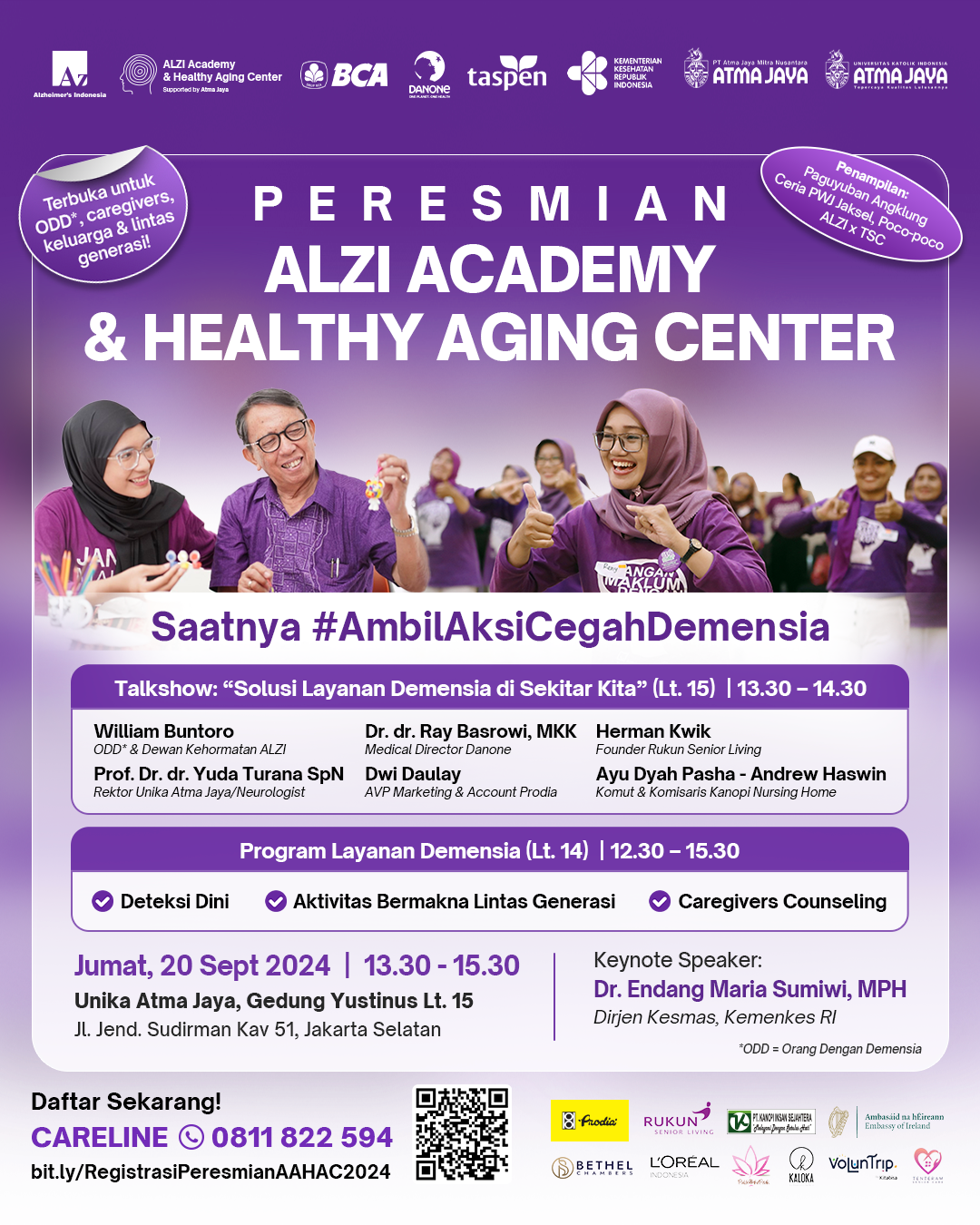
Author : Virginia Geraldine Hanny Prasetya, S.Psi
Editor : Tara Puspitarini Sani, MD, MSc (Dementia)
As the current COVID-19 pandemic develops, it is not a surprise to see that our government has set some rules and warnings for the citizens to keep them safe from the virus. Not only through raising awareness for a clean and healthy lifestyle as preventative measures, but also through social distancing measures to reduce the spreading of the virus.
However, not everyone is following these advices, believing COVID-19 will not affect them – and we can see these issues in every generation, from young adults to older people.
A lot of older people also still have some difficulties understanding the information around COVID-19, while those aged 65 and over have been found to be greatly impacted by this disease.
In this article, we will discuss some possible challenges in communicating COVID-19 information to older people.
Firstly, because COVID-19 is a new disease, the amount of research on this disease is still limited. This leads to information without any reliable sources spreading in public. For example, some broadcast messages spread through instant messaging applications recommend eating a particular type of food to prevent COVID-19 or giving misinformation to self-diagnose COVID-19 at home. This kind of misinformation or hoax will cause confusion. Always cross-check every information we receive with reliable sources and choose which ones are correct and useful, before delivering it to our older family members.
Secondly, some older people may be resistant towards the government’s advices, such as social distancing. It is possible that this stems from the fact that they have lived longer than most of us and thus have lived through the good and bad in life. They also might have gone through many difficult circumstances for all their life and thus viewing this not as seriously and underestimating the scale of this outbreak. Some older people might think they have lived long enough and thus not afraid of getting infected or even died from it; while some may believe they are still healthy and strong enough and would only be mildly affected by the virus or not at all. In dealing with this situation, explain to them that their family and friends would be very devastated if they, by any chance, were infected. We would love for them to be healthy and emphasize that it is our needs – their loved ones – instead of theirs. We can also address the issue about how a pandemic of this scale is something that has never happened for the last century, thus it requires our combined efforts to stop it.
Thirdly, family dynamics. Sometimes, parents-children dynamics gets in the way of older people receiving information and adopting preventative measures. When their child was still underage and in their care, the parents are the one who have more knowledge and take responsibility in everything. Even when their children are already adults, some older people find it hard to switch the carer roles with their children. If you think this might be one of the reasons why your elderly parents refuse to receive information or advice from you, try to ask them for a favour to do the preventative measures for the sake of your wellbeing and peace of mind, not for them. For example, you can say that you are worried about this epidemic and want them to stay healthy so that they could continue to tell bedtime stories for their grandchildren.
If you think your family dynamics still prevent you to deliver information to your elderly parents or family members, consider asking help from someone else whom they trust to convey important information to them. For example, another family member, their close friends, trusted local religious leaders or village officials. Another alternative is to show them some articles or educational videos that are delivered by public figures they respect.
Last but not least, cognitive impairment such as dementia. This would affect the older person’s capacity to receive and retain new information. Hence, they might forget to apply preventative measures, for example washing hands regularly. Dementia can also interfere with communication and impair individuals’ ability to understand causal
relation , therefore making it harder for them to understand the logical basis of doing preventative measures during this epidemic.If by any chance you have family members who is living with dementia, please read our other article “How to communicate COVID-19 information to older people with dementia” [1]
References:
- Akers, W. (2020). 5 Tips to Help You Talk to Your Older Parents About Social Distancing. Retrieved from https://www.healthline.com/health-news/talking-to-your-parents-about-the-importance-of-social-distancing#2.-Come-from-a-place-of-love-not-control
- Alzheimer’s Association. (n.d.) Coronavirus (COVID-19): Tips for Dementia Caregivers. Retrieved from https://www.alz.org/help-support/caregiving/coronavirus-(
covid -19)-tips-for-dementia-careAbout the author:
Virginia Geraldine Hanny Prasetya graduated from Atma Jaya Catholic University of Indonesia with a Bachelor in Psychology. She is a research assistant and a facilitator for a group cognitive stimulation therapy programme run by Atma Jaya for older people.


